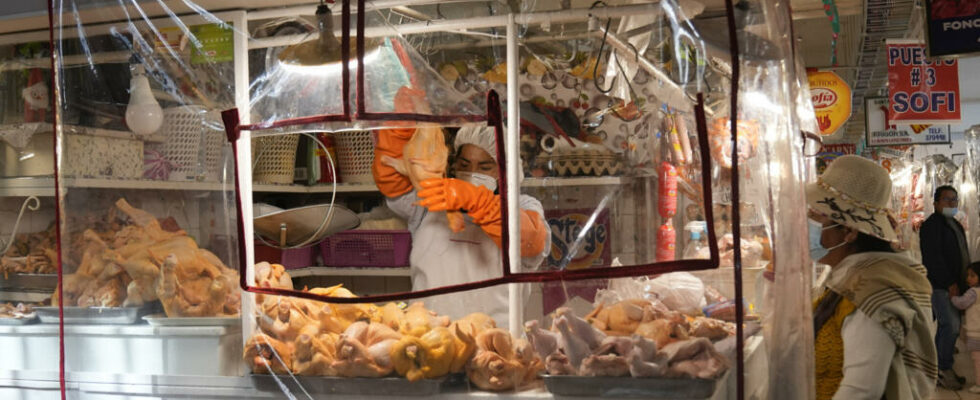Bolivia has been paralyzed for more than two weeks due to blockages in the Cochabamba region in the center of the country. Result: in La Paz, the administrative capital of the country, the shortage is rife and prices are exploding. Chicken is particularly at the heart of this political and economic crisis. This staple food has almost become inaccessible for the inhabitants of La Paz, the Paceños.
4 mins
From our correspondent in La Paz, Camille Bouju
At the Sopocachi market, in the heart of La Paz, Esteban looks thoughtful and tired behind his stand. In this market, which is usually so noisy, today we can hear each of our steps echoing, and the normally unpleasant smell of raw meat is not there. Esteban’s chicken stall, a seller for more than thirty years, is looking bad. Around ten chickens to offer fight a duel there. “ Today, there are half as many, and I don’t even know if I will have any to sell tomorrow », he breathes worriedly.
For two weeks the country has been paralyzed by blockades initiated byEvo Morales. The ex-president, from 2006 to 2019, is implicated in a case for “rape, trafficking and trafficking in human beings”, due to a relationship he allegedly had with a 15-year-old girl. And his supporters are trying to protect him from arrest.
Also readPro-Morales demonstrations in Bolivia: hundreds of tanker trucks blocked since Monday
These blockages delay the arrival of fuel and also prevent the arrival of food shipments to La Paz. They are mainly concentrated around Cochabamba, stronghold of Evo Morales, the main chicken exporting region, strategically located in the center of the Bolivia. Result: meat, and especially chicken, is in dire shortage and prices have skyrocketed.
To remedy this, the government decided to set up an airlift to deliver 40,000 kilos of chicken daily. This delivery by plane, which makes it possible to circumvent blockages, also contributed to the increase in price. In La Paz, the price of chicken has almost doubled, from 40 pesos, or about 5 euros, to more than 70 pesos. “ The chickens are stuck in Cochabamba. Those who arrive travel by plane, and become luxury chickensquips Esteban, who checks that his merchandise is cool. If this circus doesn’t end, we won’t get out of it. »
“ It’s the last chicken we eat »
“ This is worrying for everyone. For consumers, it’s difficult because wages are no longer enough. » A couple of customers arrive and break the vegetative state of the seller, sitting behind his poultry. But upon hearing the price per kilo, they jump and immediately try to negotiate. “Please, it’s already been a week since we ate meat, please, we’re not going to make it », they beg. This sudden increase is difficult for customers to accept.
“ It’s very expensiveDiego despairs, but the sellers explain that they only earn 2 pesos [30 centimes d’euros, NDLR] on each chicken, so we can’t take away their salary either. It’s the last chicken we eat !he exclaims as he leaves, his plastic bag in hand. I’m going to wait until the prices drop to buy some again.. »
But given the situation, prices are not about to drop: despite the government’s airlift, quantities remain insufficient to meet demand. Besides, Micasa didn’t sleep all night to be able to sell chickens this morning. She is dozing against the wall when her phone rings. “ No, just one for now, I know, yes, I’m trying, okay, see you tonight », she whispers on the phone to what seems to be someone from her family. “ We all struggled from 3 a.m. to get these chickens – there are five in front of her – and the customers are complaining because they think we are taking advantage of the situation to raise prices », Explains the merchant, who has only sold one chicken since this morning.
Daily losses of around $99 million
Bertha, who sells vegetables and starchy foods further away, approaches slowly. Its pollera navy blue – traditional skirt of cholitas (Bolivian women) – seems heavy. “ Trade me a chicken for some potatoes », she asks, removing her face from her two brown braids which fall down her back. But Micasa refuses, because she needs the chicken’s money: “With my husband, we have no salary, we live and support our family with the chicken that we sell every day, in the different markets. » She shows her almost empty wallet. A few silver coins are hidden in the corners. In this market, some stands are even closed. “My friends had nothing to sell today. »
Bolivian authorities estimate that the blockage causes daily losses of around $99 million (€91 million). And if the situation persists, it could even affect meat production for the end-of-year holidays.
Also readBolivia: the government accuses Evo Morales of having “staged” his supposed assassination attempt
